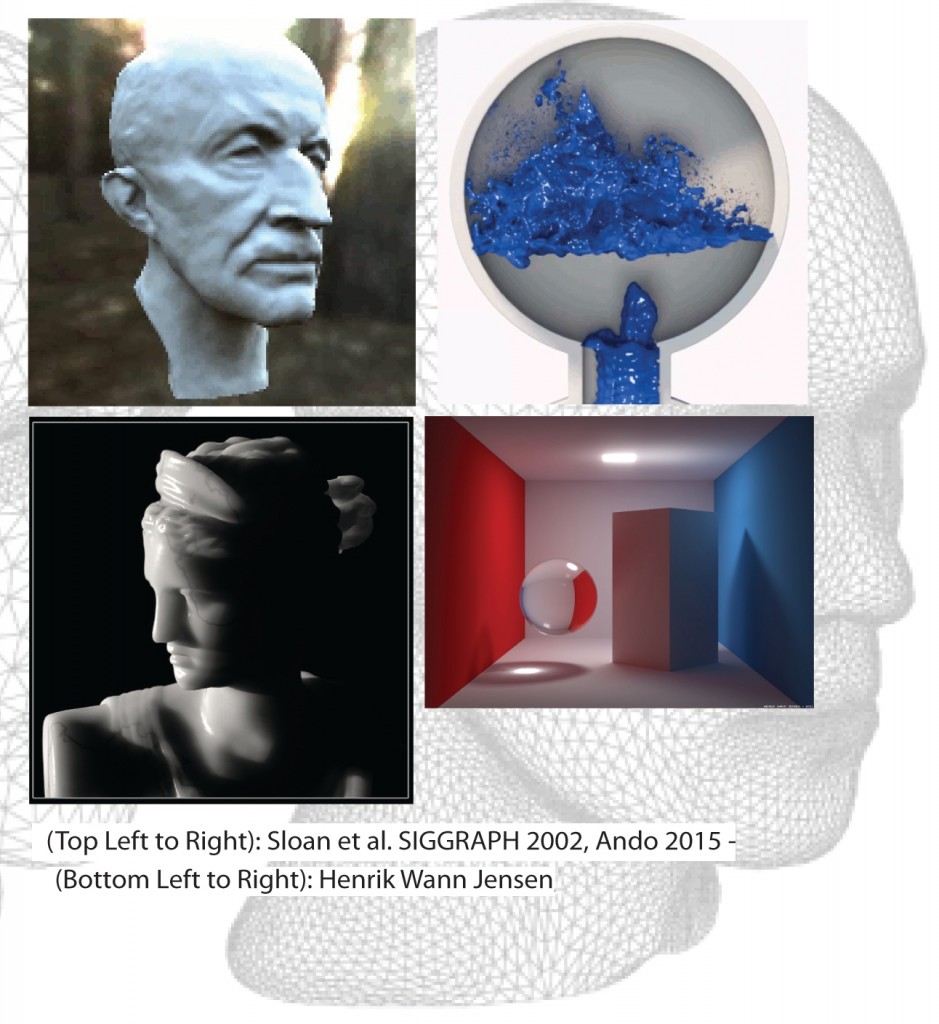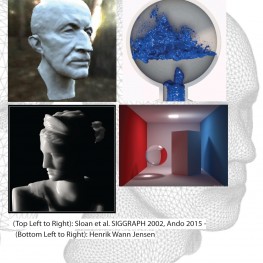Categories
OVERVIEW
CAP6701 Advanced Computer Graphics builds on the introductory computer  graphics course. Students will learn advanced concepts related to interactive graphics, illumination and modeling of curved geometry. Topics include (but are not limited to) realistic image synthesis, radiometry and reflectance, physically-based appearance modeling, spherical harmonics, computational photography, image-based rendering, 3D scanning and multi-spectral imaging, imaging spectroscopy in computer graphics, surface reconstruction, collision detection and collision response, and scene navigation in the context of high-level graphics environments.
graphics course. Students will learn advanced concepts related to interactive graphics, illumination and modeling of curved geometry. Topics include (but are not limited to) realistic image synthesis, radiometry and reflectance, physically-based appearance modeling, spherical harmonics, computational photography, image-based rendering, 3D scanning and multi-spectral imaging, imaging spectroscopy in computer graphics, surface reconstruction, collision detection and collision response, and scene navigation in the context of high-level graphics environments.
Instructor: Dr. Corey Toler-Franklin, CISE Department, University of Florida
Contact: Office CSE 332, Lab CSE 319, ctoler@cise.ufl.edu
Office Hours: MWF Period 6 (12:50 pm – 1:40 pm) and by appointment
Location: CSEE119
Time: MWF Period 7 (1:55 pm– 2:45 pm)
Online Course Management: Canvas
Website: https://toler-franklin.com/course/cap6701-advanced-computer-graphics/
PREREQUISITES:
Introductory Computer Graphics or consent of instructor. Experience with C or C++ programming is expected. Data structures and algorithms, linear algebra and discrete math, basic calculus is also required.
**Contact instructor if you are not sure you are prepared for the course**
SYLLABUS
TEXTBOOKS: None. There is an assigned reading list of research papers, notes and tutorials that cover topics in the course.
MATERIAL AND SUPPLY FEE: None
COURSE WORK
35% Course project and paper
20% Programming assignments
20% Written exercises
15% Research paper presentation
10% Class attendance and participation
Course Project
Advanced Computer Graphics
Overview
We have covered several advanced topics in computer graphics in class including Realistic Image Synthesis, Computational Photography, Shape from Shading, 3-D Scanning, Multispectral Imaging, Imaging Spectrometry, Curves and Surfaces and Physics-Based Simulations (Particle systems and Cloth Simulation). Your course project should implement research that demonstrates your under- standing of one of these topics.
Programming Assignments
Sampling and Warping
Overview
In this exercise you will generate sample points on various domains: disks, spheres, hemispheres, and a few more. The Nori2 code base has interactive visualization and testing tools to make working with point sets as intuitive as possible. Note that all the work you do in this assignment will serve as building blocks for later assignments when we apply Monte Carlo integration to render images.
ACADEMIC INTEGRITY
The work you submit must be your own. Although it is fine to have some level of discussion with piers on assignments, the work you submit must be your own. You may work in groups of 2 for the programming assignments and the course project, but all other work should be done individually. DO NOT POST SOLUTIONS TO PROBLEMS AND PROGRAMMING ASSIGNMENTS ONLINE!
MANDATORY HONESTY STATEMENT:
All students admitted to the University of Florida have signed a statement of academic honesty committing themselves to be honest in all academic work and understanding that failure to comply with this commitment will result in disciplinary action. This statement is a reminder to uphold your obligation as a UF student and to be honest in all work submitted and exams taken in this course and all others.
UF Counseling Services:
Resources are available on-campus for students having personal problems or lacking clear career and academic goals. The resources include: UF Counseling & Wellness Center, 3190 Radio Rd, 392-1575, psychological and psychiatric services. Career Resource Center, Reitz Union, 392-1601, career and job search services.
MANDATORY SOFTWARE USE STATEMENT:
All faculty, staff and student of the University are required and expected to obey the laws and legal agreements governing software use. Failure to do so can lead to monetary damages and/or criminal penalties for the individual violator. Because such violations are also against University policies and rules, disciplinary action will be taken as appropriate. We, the members of the University of Florida community, pledge to uphold ourselves and our peers to the highest standards of honesty and integrity.



